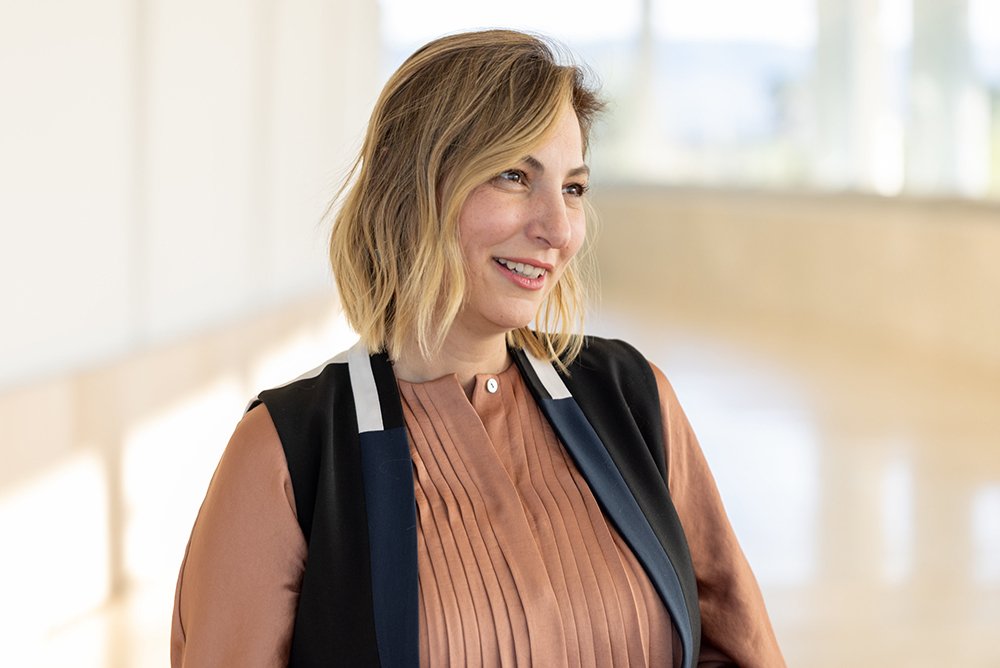
Photo by Luis Luque.
Shushan Karapetian is the deputy director of the USC Institute of Armenian Studies. Her research focuses on the intersection of language and transnational Armenian identity. She also hosts a podcast series “Language Therapy with Dr. K.” Before speaking at a Zócalo/Soraya event, “How Do Homelands Cross Borders?,” she spoke to us in the green room about Pagan goddesses, the Goddess of Pop, and her most used Armenian word.
What is one of the best places in L.A. to find Armenian culture?
Abril Books in South Glendale, hands down. The name means “to live.” It has the largest collection of Armenian books from both Armenia and the diaspora. The owner is the son of the original founder, who had a real vision of keeping literature alive in the diaspora. Besides the collection, the environment is very special. I basically donate my paycheck to that store, to my husband’s chagrin.
If you could have lunch with any person—dead or alive—who would it be?
I have two. One would be Hrachia Acharian who was the preeminent Armenian linguist, whose work I use on a daily basis for my word-of-the-day series. The other would be Sergei Parajanov, the Armenian filmmaker from the Soviet era. He basically revolutionized film, and has these films that are more like collections of mosaics glued together.
What is your favorite holiday?
New Year’s. That’s a Soviet legacy, and I’m owning it. We also have this amazing holiday Vardavar where we just splash each other with water at the end of July. Initially, it was in honor of the goddesses in the Pagan pantheon, but then Christianity subsumed it. It’s the one day in Armenia where all social rules and norms are off—whether you’re in a business suit or bridal gown or bathing suit: you will get splashed with water.
What is one of your most used Armenian words?
“Jan,” which is of Persian origin. It means spirit, body, soul. It’s come to mean a term of endearment. The closest word in English is “dear,” but that’s so not right. If I’m watching a performance and I’m moved and want to show my appreciation, I will say “jan” with an elongated vowel. It has a variety of uses. Some Armenian purist is going to be really annoyed that I chose a Persian origin word here.
What are some ways you think people try to preserve cultures across generations?
I would replace the word “preserve” with “cultivate.” Preserve already implies it’s dead or dying—you preserve pickles, you put them in a jar in an unchanging state. Whereas culture is a living thing that is evolving at all times. I think language is the main key that unlocks access to culture, and you can unlock it on your own terms, access what you please. Music, dance… food is probably the most versatile and universally accessed: third and fourth generation Armenian Americans who don’t speak a lick of Armenian, who go to church once or twice a year, are obsessed with the food. Language is really important but doesn’t tend to survive as long—music and food and dance go a long way.
Would you rather watch a reality show based on the Kardashians or Cher, the Goddess of Pop?
Cher. When I was in my late teens, Cher was having a concert in Las Vegas and my family decided to go, because she’s Armenian, obviously. This is the early 2000s, the era of Britney Spears. Cher comes on stage sitting on an elephant. She slides off the elephant and grabs the mic and says: “All this new talent—the Christina Aguileras and Britney Spears’ of the world—they’re amazing. I’m impressed.” I thought: I never knew her to be so humble. Then she takes a dramatic pause and says: “Follow this, you bitches.” My mom asked me to translate.



